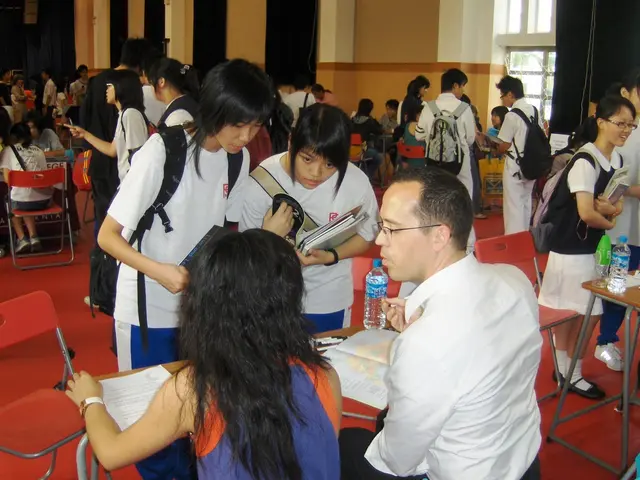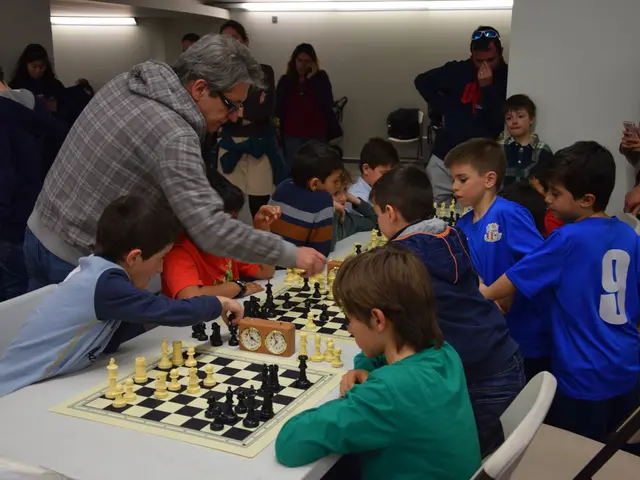A New Era: Merz and Trump's Telephone conversation Aiming for a Swift Trade Dispute Resolution and Ukrainian Peace
Initial discussion: Merz and Trump aim for swift resolution of trade disagreement
Social Media Sharing:
- Copy Link
Just days after assuming office, Chancellor Merz held a conversation with US President Trump. Trump pledged his backing for European peace efforts, especially concerning Ukraine. Both sides agreed on the importance of avoiding a full-blown trade war.
After the call, it was described as "exceptionally positive, casual, and cordial" by those within government circles. The discussion took place on Thursday evening—two days after Merz was appointed Chancellor in the Bundestag. Trump congratulated him, and Merz expressed his gratitude while emphasizing the USA's continued role as a "vital ally and partner."
The meeting's main focus was Ukraine. Both leaders agreed to collaborate closely to put an end to the ongoing Russian aggression. The German government spokesman, Stefan Kornelius, explained that the two leaders shared the vision that the violence in Ukraine must cease immediately. Russia must now agree to a ceasefire to create a conducive environment for talks. Trump promised to back Germany's peace efforts, teaming up with France, Britain, Poland, and other European allies to achieve lasting peace.
Swift Trade War Resolution
The second topic of the conversation revolved around the trade conflict between the US and the EU. Trump and Merz expressed a shared desire to resolve the disputes between the two regions promptly. However, a solution has yet to materialize. Prior to the conversation, the EU Commission announced preparations for additional tariffs on US exports valued at approximately €95 billion, if negotiations with Washington fail to produce a solution.
By July, a 90-day deadline set by Trump for EU offers will elapse. If there is no agreement, Trump intends to impose extensive new tariffs on imports from the EU. These would be added to the tariffs he has already imposed.
Merz criticized the US government's recent criticism regarding the classification of the AfD by the Federal Office for the Protection of the Constitution as "securely right-wing extremist." At the same time, he advocated for the abolition of all tariffs and the significant expansion of mutual recognition of technological standards. "I don't want us to slide into an open trade war," he said.
Invitations Galore
At the outset, Merz and Trump had little personal connection. They had only briefly met each other years ago in New York. As reported by German government circles, Merz extended an invitation to Trump to visit Germany. In doing so, he also mentioned the German roots of the US President and pointed out that he knew the hometown of Trump's ancestors: Kallstadt on the Wine Road in Rhineland-Palatinate. Trump's grandparents had emigrated from there to New York at the end of the 19th century.
Trump indicated a willingness to accept the invitation. To date, as President, he has only been to Germany for the G20 summit in 2017, aside from brief stopovers at the US airbase Ramstein.
In turn, Trump invited Merz to Washington. The Chancellor has already publicly stated that he would like to travel to the US before the G7 and NATO summits in June, which will take place within the next six weeks. The G7 summit will take place in Canada in mid-June, followed by the NATO summit in The Hague.
- The economic and monetary union, specifically the EU and US, was a crucial topic in Merz and Trump's telephone conversation, highlighting the importance of avoiding a full-blown trade war and resolving disputes promptly.
- The ongoing Russian aggression in Ukraine was another significant issue discussed during the conversation, with both leaders agreeing to collaborate closely to end the violence and create a conducive environment for talks.
- In politics, policy, and general news, Merz extended an invitation to Trump to visit Germany, emphasizing the German roots of the US President and mentioning the hometown of Trump's ancestors, Kallstadt in Rhineland-Palatinate.
- Trump accepted the invitation and also invited Merz to Washington, setting the stage for diplomatic visits in the near future.
- In the realm of war-and-conflicts, policy-and-legislation, and politics, both leaders shared the vision that the violence in Ukraine must cease immediately, with Russia agreeing to a ceasefire as a necessary step towards lasting peace.








